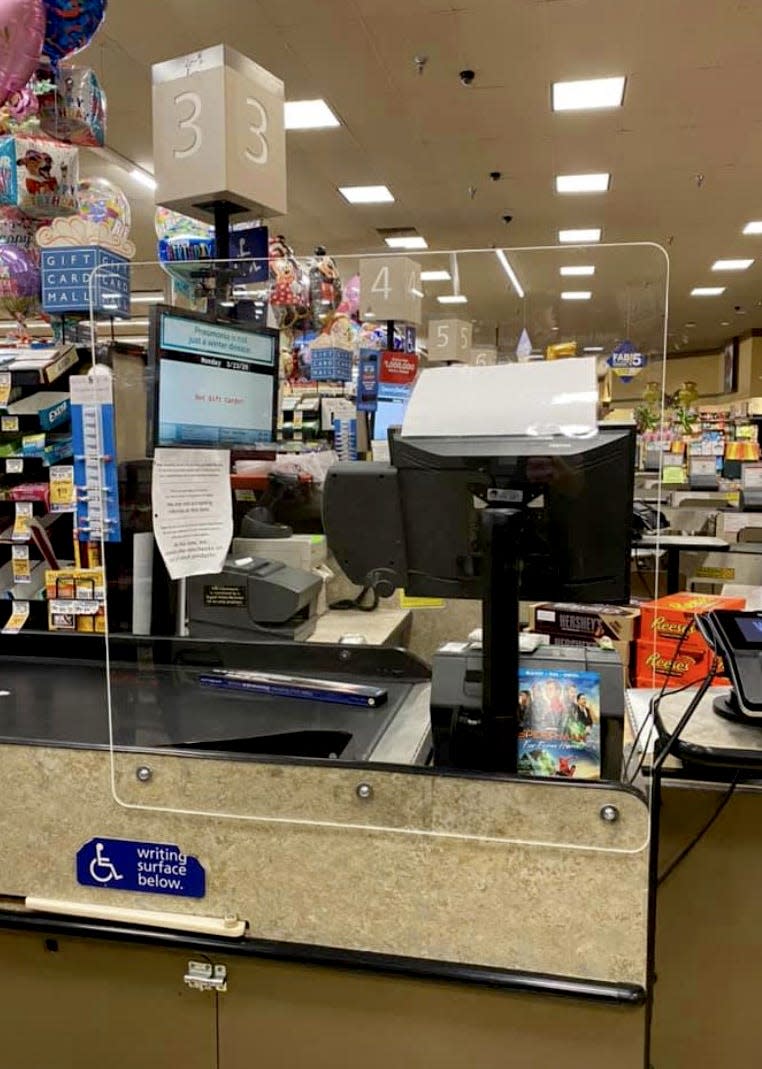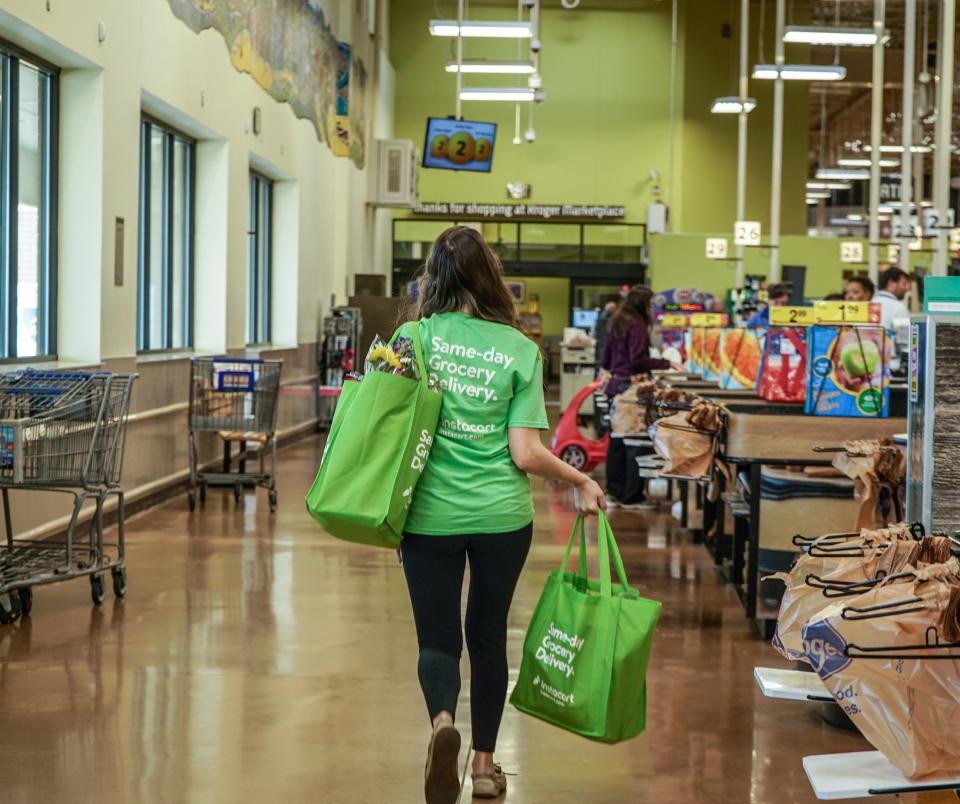'Some bills are not going to stop': Laid off workers turn to essential jobs amid coronavirus pandemic
Rideshare driver Josh Dunn of Indio describes himself as a case of "super obsessive-compulsive disorder."
"A lot of people weren't germophobes before this happened, like me," Dunn said. "Now they're out there and hoping for the best."
Add the threat of coronavirus to everyday life and it makes things unsettling for those who are currently not working but looking to find employment in what's categorized as "essential jobs." Some examples include health care, grocery stores, utilities and rideshare and delivery services.
Dunn has signed up for every rideshare and delivery platform available, including Instacart, a grocery delivery and pickup company based in San Francisco. The company is hiring 300,000 workers across North America to meet surging demand for grocery deliveries, as millions of people are urged to stay home to limit the spread of coronavirus.
He was signed up with the platform in August, but found it difficult to schedule around because of its assigned scheduling at the time. It also didn't pay as well as Lyft or Uber. This week, he downloaded the app to start working the platform again.

"Now it's more like Uber," Dunn said. "There's nothing about shifts, blocks or anything like that. All the other rideshare drivers I know are saying Instacart is banging right now. That's what people need right now. They need people to shop for them, they don't need to go to the bar or go to work anymore."
The drivers are referred to by the company as "full-service shoppers." Instacart lets users shop from grocery stores like Whole Foods, Costco, Safeway, among others, with the good then delivered to their homes. Full-service shoppers go into the store and pick every item off the shelves for checkout then delivery. They're timed on each order.
For the past three weeks, grocery stores have struggled to keep products like canned goods, toilet paper, dairy products and other essentials on the shelves. If the store is out of stock on the desired items, they have to find a similar item and communicate with the customer through the app.
"That's one of the places where it gets a little tricky," Dunn said. "Often times, you'll have to start communicating with the person who ordered through the app, and you're getting timed while you're shopping. So if the person doesn't respond promptly, you can get dinged on your shop time. You're trying to make sure you got what they need, but the clock is running."
Instacart Founder and CEO Apoorva Mehta said the company hopes to provide "flexible earnings opportunities during this time" to those urged to stay home. Mehta didn't offer any precautions for its full-service shoppers, but said Monday that drivers would be compensated if they get sick.
"All in-store shoppers nationwide now have access to sick pay, an accrued benefit that can be used as paid time off if you’re absent from work due to illness or injury," Mehta said. "Additionally, any full-service or in-store shopper can receive up to 14 days of extended pay if you’re diagnosed with COVID-19 or placed in individual mandatory isolation or quarantine."

"I have severe asthmatics in my family. I haven't seen them for 10 days now at least, and I refuse," Dunn said. "I refuse to see my children, and I don't want to give anybody the virus if I have it. I don't want to get sick from the perspective of I don't want to be sick, feel ill, be unhappy, not have a good time and go to the hospital. But more concerning to me is who I might kill if I get it. That's my big concern."
The bills don't stop
Claudia Armenta of Indio was laid off from her position as marketing representative for a local tribal business last week. She was given her last check, including her vacation and personal time off hours, and was told if they closed for more than two weeks, to file for unemployment insurance.
"Some bills are not going to stop, and I am unsure of when business will pick up again," Armenta said.
She added that she is considering applying at local grocery stores in her area, which include Walmart, and is aware of rising coronavirus infection rates.
Walmart, the world's largest retailer, said on Monday that it was looking to fill 150,000 positions nationwide, and those taking positions in its fulfillment centers will earn $2 more an hour through Memorial Day. Fulfillment center employees, and hires that they refer, will also be able to each get a $250 bonus after the new employee has been on the job for 90 days. Other grocery chains and retailers are looking to add thousands of temporary employees to work in their stores.
The Atlantic reported on Tuesday that employees of the grocery chains Whole Foods, Trader Joe's, King Soopers and Fred Meyer tested positive for the virus. The United Food and Commercial Workers International Union, which represents the employees of some grocery stores, said only six of its members are known to have tested positive for the coronavirus.
"I've always tried to be cautious," Armenta said. "When cash handling, I would always try not to touch my face. After so many transactions, I would clean my hands with hand sanitizer. I would also wipe down my desk, office phone and even my cellphone. I definitely plan on using gloves more often."
But Armenta's main concern is for her family members. Riverside County, California, coronavirus cases jumped to 70 on Wednesday, while the death toll increased by one to seven total.
"When I noticed that coronavirus was spreading, I started to prepare things at home for my parents to go out as little as possible," Armenta said. "I fear for my parents. They are senior citizens and have health conditions. Especially for my mother, she is anemic, has a low immune system and diabetes."
No events cause a ripple
Connor Cross of Desert Hot Springs was laid off from his job as a supervisor for an event production company, and has applied for positions at Walmart, Lowe's, Aldi's and Vons. In the past, he's worked setting up private events and concerts, including Coachella and Stagecoach.
"If there (are) no events, I can't be sent to do anything," Cross said. "I just spent eight years developing myself in an industry that I love, and now I can't even do anything."
Like Armenta, he's aware of the risks of being exposed to coronavirus, which he said is not his major concern at this time.
"I'm more worried about how I'm going to feed myself and my pregnant girlfriend," Cross said. "Will I be able to get a job quick enough? With everyone losing work, will I still be able to get a job even though they're hiring a ton of people?
As of Tuesday, Cross had not heard back on any of his applications.
"I've filed for unemployment in the meantime, and I'm hoping that comes through. I'm doing everything I can," Cross said. "Every day for the past two weeks, I've been doing this. There's nothing serious on my record or anything for them not to call me back, so I don't understand why. Most of these applications online tell you there's no way to call in to see if your application has been processed or to speak to a manager. Basically, we wait for callbacks within two to three weeks."
Reach Desert Sun reporter Brian Blueskye at brian.blueskye@desertsun.com.
Previous reporting by The Desert Sun staff, and USA TODAY's Charisse Jones and Josh Rivera was used in this report.
This article originally appeared on Palm Springs Desert Sun: Coronavirus: Laid off workers turn to essential jobs to pay the bills

